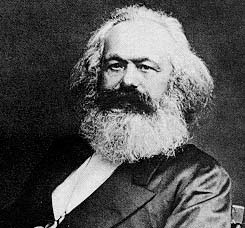
| Capitalism + Industrialism Commodification, Alienation
|
 |
劉紀雯 1999/10/14
初稿
from MARX
AND ENGELS ARCHIVE,PHOTO
GALLERYMarx in 1975; |
商品:生產使用價值(Use
value)以作交換.
-- use value, exchange value, value and price:資本:投資的金錢,目的是生產更多金錢(也就是錢滾錢). |
|
I. 商品化 -- 什麼是商品的價值? 馬克斯 in Capital, Chap 1認為:商品的價值決定於它所需要的製作時間和技術(labor time). Schmitt: other properties to consider: raw materials; "The question for Marx was how the surface reality of the marketplace is connected with the deep reality of the social division of labor, or how the marketplace assigns who works where, and when, and how much. The task is to connect the surface (the exchange of commodities) with the deep reality (the work that is done in the society to maintain it). In the context of the Labor Theory of Value, that task takes the form of trying to clear up the relation between values and prices" (108). 馬克斯的商品價值論事實上指出了產品在變為商品的過程也是一個社會化和抽象化的過程:產品的使用價值需要是他人的使用價值;價值-不管是相對價值或是等同價值-也都是抽象的.(詳見引文) II.資本主義的抽象化:
也就是價錢和利潤決定生產什麼商品,而商品決定人際關係.III.Alienation and Exploitation 商品/抽象化的過程中,勞工所經歷的就是剝削和孤離--孤離於商品以及他自己的勞動力外. |
|
|
alienation and exploitation:
"According to Marx alienation occurs in commodity production only. Under such conditions the exchangerelations of market society separate production from consumption, and the product acquires a life of its own, independent of the producer, and comes to oppress him as an alien force. Exploitation, on the other hand, is not confined to situation of commodity production. . .The serf is exploited by the feudal lord, even though he produces only use-values. . . . Exploitation, for Marx, is the appropriation of the surplus labour of one class by another class. (Barbalet 95)"The theory of alienation in Capital is derived from the labour theory of value and the concomitant theory of surplus value.
- the value of all commodities, including labour power, is determined by the socially necessary labour time required for their production;
- the worker is paid the full value of his labour power when he sells it to the capitalist;
- that when the already purchased labour power is consumed in production by the capitalist it creates, in addition to its own value, a surplus value which constitutes a nett gain to the capitalist. (Barbalet 97)
- impoverishment of the working class ensues.
". . . in Capital the worker's alienation is a consequence of the sale of his labour-power to the capitalist, rather than a result of his labour -- in the form of a commodity -- being appropriated by the capitalist, as it is in the Manuscripts. . . . While individual's alienation is a consequence of commodity production, according to Capital, it is not the individual's own production of commodities which accounts for his alienation, for the individual labourer does not produce commodities. The individual's alienation is located in the alienation of his labour power. (Barbalet 114)